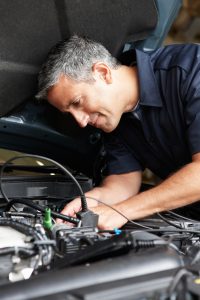 There’s nothing worse than getting into your car, buckling the seat belt, inserting your key or hitting the starter and…nothing.
There’s nothing worse than getting into your car, buckling the seat belt, inserting your key or hitting the starter and…nothing.
No roaring engine, no burst of power. The dash stays dark and everything is quiet.
Or perhaps the dash lights up faintly, but there’s a clicking sound instead of the sound of the engine. These problems point to issues with the battery and alternator.
The battery obviously provides your vehicles with electricity, whereas the alternator is a device that keeps the battery charged under operation.
Both are easily replaceable. Keep reading for three easy steps to replace your battery and alternator.
Before Starting With Your Battery and Alternator
Before you begin any car repair, there are a few steps that need to be taken.
The vehicle needs to be in neutral or park, with the parking brake on. Don’t wear loose clothing and eye protection should be worn.
Long hair should also be tied back.
An engine is built from moving parts, so it’s important that nothing can be pulled into it, causing untold damage or injury.
Check the Battery
A simple multimeter can tell you how much charge is left in the battery.
A charged battery should have 12.6 volts or higher.
If it’s 12.4 or lower, the battery needs to be charged. Even if the issue is with the alternator, a battery with a low charge can cause premature failure in a new alternator.
Replacing the Battery
To replace the battery, remove the contact on the negative lead.
Next, remove the positive lead. A wrench may be needed to remove the cover, depending on the make and model of the vehicle.
Some manufacturers use clips to secure the battery in place. If your’s has this, then loosen the bolt keeping the clip in place.
The battery can then be lifted clear from the engine bay. Batteries are heavy and need to be treated with care, so be careful handling it.
To either reinstall the now-charged battery or a new battery, reverse the process.
Lower the battery into the bay and tighten any clips.
Attach the positive terminal and tighten it. Follow this with the negative lead and tighten it.
Replace any terminal covers and you’re done with the battery.
Replace the Alternator
If the issue isn’t with the battery, then you’ll need to replace the alternator.
Before you begin, disconnect the positive terminal on the battery.
Locate the alternator on your particular vehicle and loosen the belt and remove it. Unbolt the alternator, pull it out and remove the electrical plug.
Whether you’re using a new alternator a rebuild, you just need to reverse these steps to install it.
Plug in the electrical cable and set the alternator in place. Bolt in back in place and replace the belt, tightening it back up.
Replacing Batteries and Alternators
Issues with the battery and alternator are easily resolved. With a little space and a couple tools, both are easy to remove and replace.
Performing regular maintenance allows your vehicle to run better for longer.
If you have any other problems you’d like to learn to handle, check out our blog for more DIY repairs.




